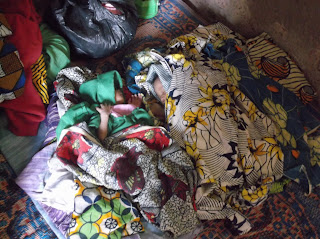On Monday I was told that husband of one of our women had
died.
He had been very ill so they took
him to the hospital and soon after he passed away.
Because the house they live in is rented, his
body could not be returned to the house for proper mourning, but was
immediately taken to the cemetery and buried.
This morning before we started our activities at Tabitha
House, we all went to visit and mourn with her.
She is a young woman from the Muslim faith. When we approached the house, there were two
elderly men sitting on a bench outside.
Following the lead of the women, we all knelt down and in unison the
women paid their respect to these family elders.
We walked inside the small courtyard. Only several could fit in the small
house. Suzanne (the pastor’s wife)
motioned that I should go inside with her along with one of our older women,
Tene. We took off our sandals and
entered a tiny room. On the left side a
mat was laid out and two women were sitting on it. On the right side of the room, there was a
piece of cloth on the floor and I was invited to share it with three other
women. We filled the small room – it would
have been difficult to get another person inside. Across from me sat the woman who lost her
husband. She covered her face with her
pink headdress. As soon as she could
contain herself, she got up to greet the three of us. When she came to me I stood to give her a
hug. African women show little emotion
and hugging is certainly not part of their culture. So it was to my surprise when she hugged me
tightly and didn’t let go, her body shaking with sobs. I prayed quietly in her ear that God would
hold her close and take care of her little family. We stood for a long time – hugging, praying, crying. It was heart rending to hear and feel the
pain she was going through. We gave her
a gift of money from Tabitha House and left.
As we walked back I thought about what her life will now be
like. She has two small children and
they will be alone in the small hut. It will be up to her to find a way to feed them,
and she doesn’t have a job or income.
She will find out if there is a relative that will take them in and perhaps
return to her home village. She might
stay, but it will be very, very difficult for her as it is basically impossible
for a woman in Sector 30 to find a job.
In our devotion this morning, we talked about Nicodemus and
his quest for a “new life”, an eternal life free from death and pain. Living in Burkina Faso has given me a whole new
perspective on the importance of that promise.
 In February's blog called "Saving Babies," a team led by Herb Buwalda of Clay Church happened upon two little babies that were literally starving to death. They had gone five days without any nourishment when we happened upon them in Pondue. With the help of Vickie Nevel and Karen Grant, we were first able to give them some water, and then when John Arnold returned with formula he found at the next village, they had their first meal.
In February's blog called "Saving Babies," a team led by Herb Buwalda of Clay Church happened upon two little babies that were literally starving to death. They had gone five days without any nourishment when we happened upon them in Pondue. With the help of Vickie Nevel and Karen Grant, we were first able to give them some water, and then when John Arnold returned with formula he found at the next village, they had their first meal.







